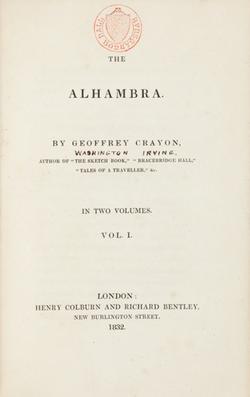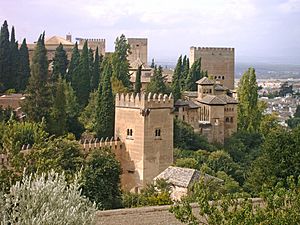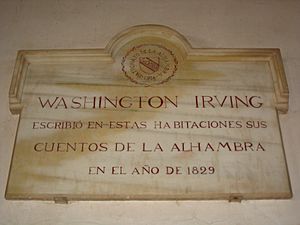Tales of the Alhambra facts for kids

Title page of first London edition
|
|
| Author | Geoffrey Crayon (Washington Irving) |
|---|---|
| Original title | The Alhambra: a series of tales and sketches of the Moors and Spaniards |
| Country | United States & United Kingdom (concurrently) |
| Language | English |
| Subject | Spanish history, the Alhambra |
| Genre | Travel literature |
| Publisher | Carey & Lea, Henry Colburn |
|
Publication date
|
1832 (revised 1851) |
| Media type | Print: hardback octavo |
| Pages | 607, in two volumes |
| 910 | |
Tales of the Alhambra is a famous collection of stories and essays. It was written by the American author Washington Irving in 1832. The book was inspired by his visit to the amazing Alhambra palace in Granada, Spain.
About the Author's Visit
In 1828, Washington Irving traveled to Granada, Spain. He had just finished writing a book about Christopher Columbus. Irving thought Granada was a "most picturesque and beautiful city." He loved its lovely landscapes.
Irving was working on another book about the history of Granada. He asked to visit the historic Alhambra Palace. Because he was a famous writer, he was allowed to stay there. A guide named Mateo Ximenes helped him.
Irving was so inspired by the Alhambra that he wrote Tales of the Alhambra. The book mixes descriptions of the palace with old myths. It also tells about real historical events. These include when French soldiers damaged some towers in 1812. An earthquake also caused more harm in 1821.
Irving filled his notebooks with observations during his trip. He felt his writing could not truly capture the beauty of the place. He wrote, "How unworthy is my scribbling of the place." After his trip, Irving moved to London. He worked at the United States Embassy there.
When the Book Was Published
The book was first called The Alhambra: a series of tales and sketches of the Moors and Spaniards. It came out in May 1832. Publishers Lea & Carey in the United States and Henry Colburn in England released it. The book was published under the name "Geoffrey Crayon". People often called it his "Spanish Sketch Book."
In 1851, Irving created a new version of the book. He called it Tales of the Alhambra.
The Book's Lasting Impact
This book helped make the Alhambra famous to people in Western countries. Today, a special plaque marks the rooms where Irving stayed. It reminds visitors where he wrote some of his stories.
Tales of the Alhambra has inspired many other works.
- Alexander Pushkin's 1834 poem The Tale of the Golden Cockerel is based on two chapters.
- This poem then inspired an opera called "The Golden Cockerel".
- Dudley Buck used parts of the book for his music in 1874.
- A German writer, Erwin von Busse, wrote stories based on the Tales in 1921.
- The 1950 Spanish film Tales of the Alhambra is based on the book.
- A Soviet cartoon from 1959 adapted "The Legend of the Moor's Legacy."
- The Villa Zorayda museum in Florida is named after a character from the book.
- The city of Alhambra, California is also named after the book. A girl reading the book suggested the name in 1874.
- A children's picture book, Prince of the Birds, was made from one of the stories in 2005.
- In 2017, an animated miniseries was made in Spain. It featured some of the tales from the book.
See also
 In Spanish: Cuentos de la Alhambra para niños
In Spanish: Cuentos de la Alhambra para niños
 | Roy Wilkins |
 | John Lewis |
 | Linda Carol Brown |



